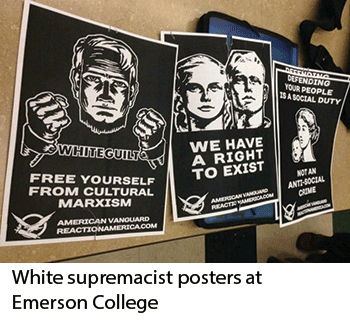No products in the cart.
United States: Managing hate speech tide
 Emerson College seems a curious place for flyers promoting white supremacist organisation American Vanguard to appear. The university, in the heart of Boston, usually regarded as a liberal city, is ranked friendliest in the country towards gay and lesbian students.
Emerson College seems a curious place for flyers promoting white supremacist organisation American Vanguard to appear. The university, in the heart of Boston, usually regarded as a liberal city, is ranked friendliest in the country towards gay and lesbian students.
These and other reasons may be precisely why it was targeted, says the university’s president Lee Pelton, who is black. “I believe the purpose was to intimidate our campus with the hope that we would respond or react in a way that they could then use to recruit members broadly,” says Dr. Pelton.
The incident highlights the complex new reality for American universities dealing with what are previously unseen levels of hate on campuses, in the wake of the election of Donald Trump as president. A report from the US Anti-Defamation League (ADL) says that white supremacists have engaged in what the ADL calls an unprecedented campaign to recruit students on campuses. ADL has confirmed 104 incidents in which campuses were blanketed in white-supremacist literature, more than half since Trump took office in January.
University students are “prime targets”, says the ADL report, because they are still making up their minds about what they believe. White supremacists also consider universities “bastions of anti-white propaganda”, a leader of the movement, Jared Taylor, has written.
That further complicates universities’ efforts to deal with this issue. Built on the foundation of free speech, some have had to contend with violence among supporters and opponents of controversial speakers. Several have tried to ban speakers, drawing even more criticism from both Left and Right — and in the case of the University of California, Berkeley a threat from President Trump that its cancellation of a talk by far-right provocateur Milo Yiannopoulos on safety grounds could endanger federal government funding.
At Middlebury College, students physically attacked political scientist Charles Murray, who argues that differences in IQ among races are genetic. And after white supremacist leader Richard Spencer spoke at a hall at Texas A&M University which had been reserved for him by a private citizen, the university changed its policy to require that future speakers be sponsored by recognised on-campus groups.
If hate speech is at record levels, so is this reflex by universities to ban provocative speakers, says Robert Shibley, executive director of the Foundation for Individual Rights in Education, a nonpartisan organisation that defends free expression. Like Dr. Pelton, Shibley suggests that white supremacists see universities as places where they can generate publicity for their positions. Much of the white-supremacist activity at US universities has come from outside organisations such as American Vanguard and the group Identity Evropa, dedicated to preserving “white European culture”.
They “know that campuses are places likely to be very hostile to their beliefs, and places where students have and always have had, more inclination to engage in activism, and by doing that they can get attention,” says Shibley. Instead of helping their students to learn to balance opposing views, “a huge number of (universities) are handling this the wrong way”, through “speech-policing,” he adds.
At Emerson, says Dr. Pelton, the situation is being used as a teachable moment. “Our job is not to protect our students,” he says. “Our job is to ensure our students have critical thinking skills that will permit them to engage all ideas with a critical eye.”














Add comment